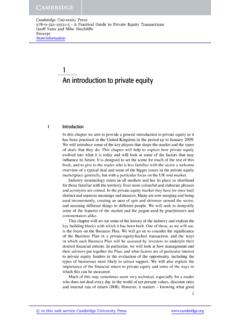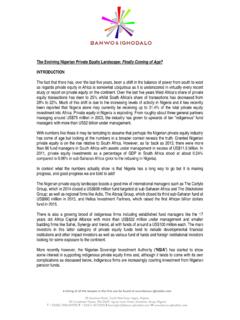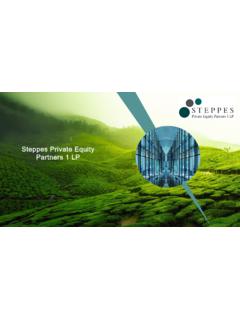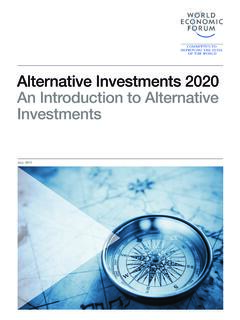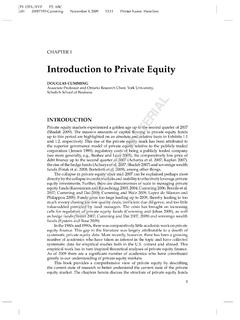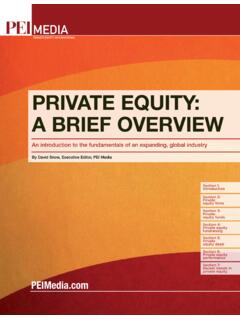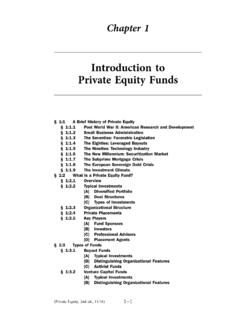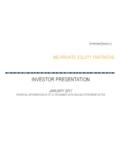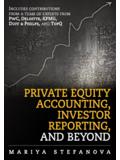Transcription of FOCUS ON: KEY CAPITAL AN INTRODUCTION to private …
1 September 2016 | The Sunday Business Post | 15 FOCUS ON: KEY CAPITALAN INTRODUCTION to private equityOver the last 60 years, pri-vate equity has developed from the original leveraged buyout and venture CAPITAL deals, once the unproven territory of financial pio-neers, into a tried and test-ed investment philosophy. Opportunity for investing in the asset class has grown considerably, with a multitude of strate-gies available across all stages, sectors and geographies. The private equity philosophy has been successfully adapted into asset strategies such as real estate and natural resources as well as spawning related strategies in credit and distressed investing. Today, most private equity investing is done through funds of pooled investor CAPITAL managed by a private equity firm. The private equity philosophy is to identi-fy and acquire private companies or assets at attractive valuations, implement initiatives to create intrinsic value during ownership, and then exit the company or asset at a multiple of cost.
2 ATTRACTION OF private EQUITYP rivate equity is an asset class favoured by the world s leading institutional investors. Some of the largest public and private pen-sion funds, sovereign wealth funds and the endowments of colleges such as Yale, Har-vard and MIT. private equity has a number of qualities that make it attractive to this calibre of investor. It has been embraced in many : investment in early stage or emerging companies which are deemed to have significant growth potential, but may not yet be generating consistent revenue. Venture investing is typically focused on equity positions and is usually non-con-trolling. Growth or expansion private equity is investment in the later fundraising stages, typically to expand operations, enter new markets or finance acquisitions. Buyout: investment in established com-panies that are generating revenue and have potential to grow organically or through add-on acquisitions.
3 Buyout transactions typically involve private equity firms tak-ing controlling equity positions and the structure of transactions normally incor-porates debt. Real estate: private equity philosophy applied to real estate assets and companies. Investments consist of controlling positions in equity or secured debt or acquiring real estate assets directly. The structure of the transactions generally will incorporate debt CAPITAL at some point in the structure. In-vestments often require an active man-agement strategy ranging from moderate repositioning of properties, to ground up development or extensive resources: private equity phi-losophy applied to natural resource assets and companies, typically in sectors such as energy, metals and mining and agriculture. This is often combined with a cyclical shift in the industries fortunes. Witness the failure of many energy companies in the US over the past two years, and the commensurate rise of special situation energy equity REAL ESTATEWith more than $ trillion in AUM globally, private equity real estate has seen continued growth in recent years as investors seek alternative return drivers and a more diver-sified approach to the real estate asset class.
4 private equity real estate managers (eg, Starwood, Apollo and Oaktree) have been particularly active in Ireland and across large parts of Europe in the aftermath of the financial crises. These private equity real estate strate-gies take a number of forms, namely core plus (dry investment-like returns), value add (10-12 per cent unlevered returns) and opportunistic (12 per cent plus un-levered returns) and are distinguished by the characteristics of the underlying real estate assets that are acquired. Core plus: a fund will typically invest in core properties, with predictable cash flows through rental income. However, the properties will require some form of enhancement or value-added element. This is a moderate risk and return added: involves buying a prop-erty, adding value to it in some way, and then subsequently selling it. Properties are considered value added when they exhibit management or operational problems, re-quire physical improvement, and/or suffer from CAPITAL constraints.
5 Returns are derived from a combination of rental income and appreciation of asset value. This is a mod-erate-to-high risk and return : investments follow the value-add approach, but take it a step fur-ther. Generally, these are distressed proper-ties or loans, new development projects, or properties in depressed real estate markets. Investments are tactical, often made during market downturns, and returns are primar-ily derived from a substantial appreciation of the asset value. The success of value-add and oppor-tunistic real estate strategies which are at the higher end of the risk return spectrum are dependent on the calibre of the private equity firm implementing the strategy and purchasing the assets for the fund. BENEFITS OF private equity REAL ESTATE Some readers may be familiar on a person-al level with direct or syndicate property investing. private equity real estate funds offer advantages over the less structured investment property directly or via prop-erty syndicates limits asset, geographic and sector diversification.
6 A home bias in real estate investing is prevalent. This typically stems from a greater familiarity with local markets and regulation. However, a con-centrated real estate portfolio increases the risk profile of returns. private equity real estate funds generate greater diversification across asset type, geography and sector. Think global diversity where the returns are generated by a private equity process using real estate at the funds are more nimble and have the ability and resources to assess many oppor-tunities. They can act swiftly to capitalise on the most attractive assets. Individuals purchasing property directly or through syndicates are more restricted, in terms of the volume of deal flow they see and can efficiently evaluate. The ability to create value through ac-tive ownership is a key strength of private equity real estate, and is difficult for a di-rect owner or syndicate to replicate in a meaningful manner.
7 The top tier private equity real estate managers are also able to secure favourable financing from lenders and discounts from vendors when such assets are purchased on a portfolio TO private equity REAL ESTATE For a non-institutional investor, access to private equity real estate is one of the big-gest barriers to the asset class. This is due to both the large minimum investment sizes, typically 5 million to 10 million, and the difficulty associated with accessing top-tier managers. Fund-of-funds are the ideal route to ac-cess this asset class, with a structure offering investors a complete private equity real estate solution. A full private equity real estate programme in a single investment vehicle allows individuals to obtain all the benefits of investing in the asset class with-out the access, minimum commitment or operational considerations. Fund-of-funds also offer investors diver-sification across strategies, vintages, sectors and geographies.
8 This level of diversification can be difficult to achieve and maintain for a single investor. Access to leading managers is another consideration and advantage for established fund-of-fund managers, who are regularly raising funds and making commitments on an ongoing basis as they establish and main-tain relationships with top-tier managers. The ability to carefully diversify across a select group of leading managers is advan-tageous, as the dispersion of performance between top quartile and bottom quartile managers is significant. SUMMARYThe current market environment suggests that returns from traditional assets are likely to disappoint from both a return and a vol-atility perspective in the near and medium term. Investors are increasingly looking to alternative investments with the potential to produce superior risk-adjusted returns. Qualifying investors now have the ability to access alternative strategies, such as private equity , through fund-of-funds structures thereby complementing their portfolio and providing broader diversification and additional return streams.
9 Key CAPITAL , through its regulated Wealth Management and Investment Management subsidiaries, has consistently provided private equity solutions to its clients for the past ten yearsLet Key CAPITAL be your guide to a discipline that has grown considerably from its origins in the world of leveraged buyouts and venture CAPITAL deals
